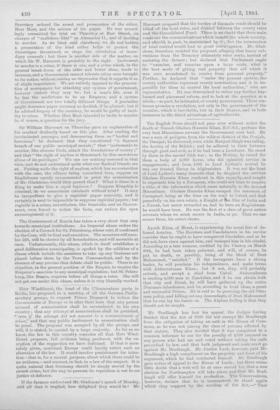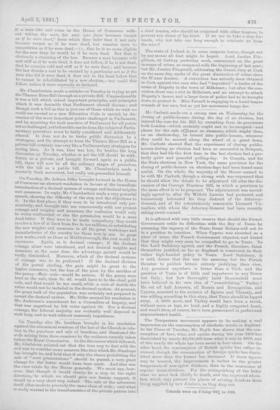Mr. Bradlaugh has lost his appeal, the Judges having decided
that the Act of 1869 did not exempt Mr. Bradlaugh from the obligation of taking an oath in the House of Com- mons, as he was not among the class of persons affected by that statute. They also decided that it was competent to a common informer to sue for the penalty of £500 imposed on any person who had sat and voted. without taking the oath prescribed by law, and that both judgment and costs must go. against Mr. Bradlaugh. Mr. Justice Lush, however, paid Mr. Bradlaugh a high compliment on the propriety and force of his argument, which he had conducted himself. Mr. Bradlaugh gave notice of appeal to the House of Lords ; but there seems little doubt that a writ will be at once moved for, that a new election for Northampton will take place, and that Mr. Brad- laugh will offer himself for re-election. The Conservatives, however, declare that he is incompetent to stand again which they support by tho wording of the Act,—" That if a man sits and votes in the House of Commons with- out taking the oath, his sent ipso facto becomes vacant 'as if he were dead," from which they infer that it not only becomes vacant as if he were dead, but remains open to .competition as if he wore dead,—i.e., that he is no more eligible for the seat than he would be if he were dead. But that is obviously a straining of the law. Because a man becomes cold and stiff as if he were dead, it does not follow, if he is not dead, that he remains cold. and stiff as if he were dead ; and because the law directs a seat to be vacated by a particular act as if the man who did it were dead, it does not in the least follow that he cannot be rehabilitated by a new election,—nor could this follow, unless it were expressly so declared.

































 Previous page
Previous page